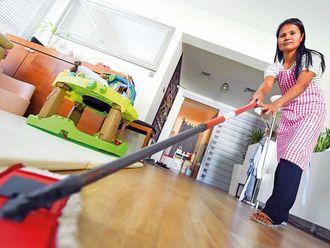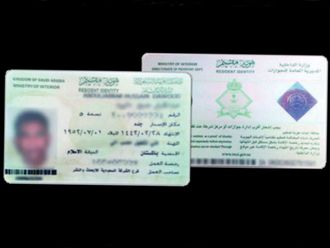
Santa Ana: The Saudi princess and her family had crossed the globe in May with an entourage of servants and settled into one of the labyrinthine upscale communities that dot Orange County, California.
In the earth-toned towers of Irvine’s Central Park West, where valets park the BMWs of Saudis and Qataris, a wealthy clan spread over four condo units did not seem out of place.
Then, early Tuesday, one of the servants darted out of the complex and flagged down a bus. The Kenyan woman clutched a suitcase and a pamphlet. The paper had been given to her at the American Embassy in Saudi Arabia, where she had secured a travel visa, and warned of the dangers of human trafficking.
Within hours, the woman was telling Irvine police a dark story of modern-day slavery, and detectives descended upon Central Park West.
On Thursday, the princess appeared in an Orange County courtroom, charged with one felony count of human trafficking. Prosecutors said Meshael Alayban, 42, “did unlawfully deprive and violate the personal liberty” of the Kenyan woman by forcing her to cook, clean, do laundry and perform other household chores for meagre pay. Authorities are investigating whether four other servants working for the princess’ family were also victimised.
The case was met with shock and outrage in Irvine, a city famous as a melting pot of many cultures. But experts and law enforcement officials said that in Saudi Arabia, the servant’s working arrangement is fairly commonplace.
“The people who are hired as such think they’re getting a benefit from it. ... They’re getting a roof over their head. They’re getting fed,” said Claude Arnold, special agent in charge of homeland security investigations in Los Angeles and southern Nevada. “On the face of it they think they’re getting treated well. So they don’t think of themselves as victims.”
Completely docile
Khalid Abou Al Fadl, a professor of Islamic law at the University of California, Los Angeles, said servants are treated so poorly for so long, “that they become completely docile, the employer cannot imagine them as anyone who has free will, so they comfortably view them as part of the baggage and bring them to the US or Europe.”
Sometimes, however, servants use these trips as a chance to escape. “There have been warnings from the Saudi government to wealthy people not to bring their domestic servants when they travel to the US or Europe, for precisely this reason,” Abou Al Fadl said.
Alayban’s attorney, Paul S. Meyer, downplayed the incident as a dispute between the princess and her servant over hours worked and wages paid. There was no physical abuse in the household and the woman was not physically restrained, he said.
“We ... expect that the truth will resolve this matter,” he said in a written statement.
In March 2012, Alayban — one of six wives of Saudi Prince Abdul Rahman Bin Nasser Bin Abdul Aziz Al Saud — hired the servant through a Kenyan employment agency, authorities said. The woman, 30, said she needed money to provide medical care for her 7-year-old daughter, who remains in Kenya.
Her contract said she would work five days a week, for eight hours a day, and make $1,600 a month. After three months, she could return home if she was unhappy, authorities said.
But once she arrived in Saudi Arabia, authorities said, the princess tore up the contract, confiscated the woman’s passport and refused to return it. She was forced to work seven days a week, for 16 hours a day, and made $220 a month, she said.
She was part of a vast domestic workforce. Antoinette Vlieger, a law professor at the University of Amsterdam who has written extensively about the lives of domestic employees in Saudi Arabia, said the country employs more than one million maids from developing countries.
Most of them are very poor, she said, and their well-being is tied to the whims of their employers. If the employer abuses them, they have nowhere to turn.
“Even if they get raped and they go to the police and report that, then they were deported,” Vlieger said.
Searches
Earlier this year, the princess and her family decided to visit the US.
At the American Embassy in Saudi Arabia, the Kenyan servant was given a temporary visa and the red, white and blue pamphlet that told temporary workers that they had the right to “report abuse without retaliation” and “seek justice in US courts.”
When the family made the trip to Irvine in May, the Kenyan woman briefly got her passport back. But she was always accompanied by a family member, authorities said, and in Irvine, the princess again took the woman’s passport.
“I understand it looks like this princess was operating entirely above the law,” said Vlieger, the professor, “but she’s not used to such laws being in place.”
It’s unclear why the Kenyan woman chose Tuesday morning to slip away. “She is a smart woman,” said Steve Baric, her attorney. “I think she saw her opportunity to go to freedom and she took it.”
Once the woman boarded the bus, a fellow passenger noticed that she was upset, Irvine Police Lt Julia Engen said. After the Kenyan woman, who speaks English, shared her story, the passenger brought the woman to her workplace to call police.
Later that day, authorities searched the princess’ condo units and found the other servants. “The detective spoke to them and said, ‘Do you want to leave with us?’ “ Engen said. “And they said, yes.”
— Los Angeles Times










_resources1_16a30b3523c_small.jpg)

